This article was co-authored by Alina Goldenberg MD, MAS, FAAD and by wikiHow staff writer, Jessica Gibson. Dr. Alina Goldenberg is a Board Certified Dermatologist. She specializes in allergic contact and atopic dermatitis, patch testing, skin cancer screening and treatment, and medical and cosmetic dermatology. Dr. Goldenberg has published numerous peer-reviewed publications, textbook chapters and received grants and awards from organizations such as the National Institutes of Health and the American Skin Association. She holds a BA in Public Health from The University of California, Berkeley, a MAS in Clinical Research, and an MD from The University of California, San Diego.
There are 15 references cited in this article, which can be found at the bottom of the page.
This article has been viewed 27,914 times.
If you have eczema (atopic dermatitis), you might feel like you've tried everything to stop the itch and moisturize your skin. This can be tricky since a lot of skincare products have ingredients that trigger flare-ups. This is why aloe vera can be so helpful. Aloe vera may have anti-inflammatory, antibacterial, and antifungal properties that can soothe irritation and prevent infection in really dry skin.[1] Plus, people have used aloe vera to heal and soothe irritated skin for centuries[2] . To try it out for yourself, check out our suggestions for effectively using fresh or storebought aloe.
Steps
Expert Q&A
-
QuestionCan aloe vera make eczema worse?
 Alina Goldenberg MD, MAS, FAADDr. Alina Goldenberg is a Board Certified Dermatologist. She specializes in allergic contact and atopic dermatitis, patch testing, skin cancer screening and treatment, and medical and cosmetic dermatology. Dr. Goldenberg has published numerous peer-reviewed publications, textbook chapters and received grants and awards from organizations such as the National Institutes of Health and the American Skin Association. She holds a BA in Public Health from The University of California, Berkeley, a MAS in Clinical Research, and an MD from The University of California, San Diego.
Alina Goldenberg MD, MAS, FAADDr. Alina Goldenberg is a Board Certified Dermatologist. She specializes in allergic contact and atopic dermatitis, patch testing, skin cancer screening and treatment, and medical and cosmetic dermatology. Dr. Goldenberg has published numerous peer-reviewed publications, textbook chapters and received grants and awards from organizations such as the National Institutes of Health and the American Skin Association. She holds a BA in Public Health from The University of California, Berkeley, a MAS in Clinical Research, and an MD from The University of California, San Diego.
Board Certified Dermatologist There shouldn't be a problem if you're using the natural plant gel without added chemicals. Over-the-counter aloe vera usually isn't pure and can cause allergies or further inflammation.
There shouldn't be a problem if you're using the natural plant gel without added chemicals. Over-the-counter aloe vera usually isn't pure and can cause allergies or further inflammation. -
QuestionWhat should you put on eczema?
 Alina Goldenberg MD, MAS, FAADDr. Alina Goldenberg is a Board Certified Dermatologist. She specializes in allergic contact and atopic dermatitis, patch testing, skin cancer screening and treatment, and medical and cosmetic dermatology. Dr. Goldenberg has published numerous peer-reviewed publications, textbook chapters and received grants and awards from organizations such as the National Institutes of Health and the American Skin Association. She holds a BA in Public Health from The University of California, Berkeley, a MAS in Clinical Research, and an MD from The University of California, San Diego.
Alina Goldenberg MD, MAS, FAADDr. Alina Goldenberg is a Board Certified Dermatologist. She specializes in allergic contact and atopic dermatitis, patch testing, skin cancer screening and treatment, and medical and cosmetic dermatology. Dr. Goldenberg has published numerous peer-reviewed publications, textbook chapters and received grants and awards from organizations such as the National Institutes of Health and the American Skin Association. She holds a BA in Public Health from The University of California, Berkeley, a MAS in Clinical Research, and an MD from The University of California, San Diego.
Board Certified Dermatologist If you don't want or can't use aloe vera, try using Epsom salts to exfoliate the skin affected by the eczema, relieving the inflammation.
If you don't want or can't use aloe vera, try using Epsom salts to exfoliate the skin affected by the eczema, relieving the inflammation. -
QuestionCan Vaseline help eczema?
 Alina Goldenberg MD, MAS, FAADDr. Alina Goldenberg is a Board Certified Dermatologist. She specializes in allergic contact and atopic dermatitis, patch testing, skin cancer screening and treatment, and medical and cosmetic dermatology. Dr. Goldenberg has published numerous peer-reviewed publications, textbook chapters and received grants and awards from organizations such as the National Institutes of Health and the American Skin Association. She holds a BA in Public Health from The University of California, Berkeley, a MAS in Clinical Research, and an MD from The University of California, San Diego.
Alina Goldenberg MD, MAS, FAADDr. Alina Goldenberg is a Board Certified Dermatologist. She specializes in allergic contact and atopic dermatitis, patch testing, skin cancer screening and treatment, and medical and cosmetic dermatology. Dr. Goldenberg has published numerous peer-reviewed publications, textbook chapters and received grants and awards from organizations such as the National Institutes of Health and the American Skin Association. She holds a BA in Public Health from The University of California, Berkeley, a MAS in Clinical Research, and an MD from The University of California, San Diego.
Board Certified Dermatologist Yes, it can surely help. Vaseline is a great moisturizer that can be used to treat areas prone to inflammation such as the ones with eczema.
Yes, it can surely help. Vaseline is a great moisturizer that can be used to treat areas prone to inflammation such as the ones with eczema.
References
- ↑ Alina Goldenberg MD, MAS, FAAD. Board Certified Dermatologist. Expert Interview. 16 August 2021.
- ↑ https://www.ncbi.nlm.nih.gov/pmc/articles/PMC2763764/
- ↑ https://www.uofmhealth.org/health-library/d03707a1
- ↑ https://www.ecowatch.com/aloe-vera-skin-2646042696.html
- ↑ https://www.researchgate.net/publication/338894001_Ethnopharmacological_Studies_of_Aloe_Vera_for_the_Management_of_Eczema_Followed_by_Molecular_Techniques_through_Metabolomics_Novel_Drug_Delivery_System
- ↑ https://www.ncbi.nlm.nih.gov/pmc/articles/PMC6330525/
- ↑ Alina Goldenberg MD, MAS, FAAD. Board Certified Dermatologist. Expert Interview. 16 August 2021.
- ↑ https://www.mayoclinic.org/diseases-conditions/seborrheic-dermatitis/diagnosis-treatment/drc-20352714
- ↑ https://www.mindbodygreen.com/articles/keep-your-aloe-vera-gel-fresh-for-longer-storage-tips
- ↑ Alina Goldenberg MD, MAS, FAAD. Board Certified Dermatologist. Expert Interview. 16 August 2021.
- ↑ https://www.ncbi.nlm.nih.gov/pmc/articles/PMC5908267/
- ↑ https://www.ncbi.nlm.nih.gov/pmc/articles/PMC7540232/
- ↑ https://nationaleczema.org/raising-adelaide/
- ↑ https://nationaleczema.org/eczema/treatment/wet-wrap-therapy/
- ↑ https://nationaleczema.org/eczema-and-wet-wrap-therapy/
- ↑ https://www.mayoclinic.org/diseases-conditions/seborrheic-dermatitis/diagnosis-treatment/drc-20352714
- ↑ https://nationaleczema.org/eczema/treatment/bathing/
- ↑ https://www.mayoclinic.org/diseases-conditions/atopic-dermatitis-eczema/symptoms-causes/syc-20353273

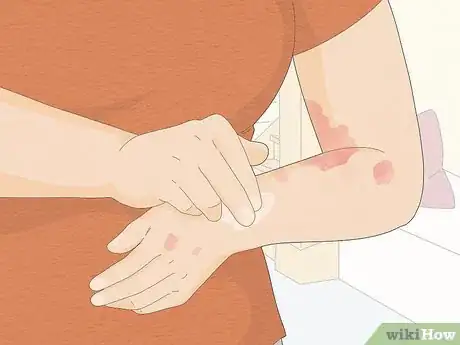
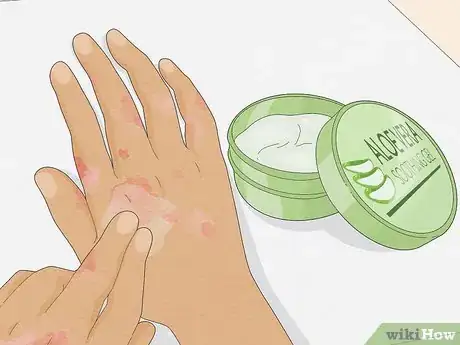
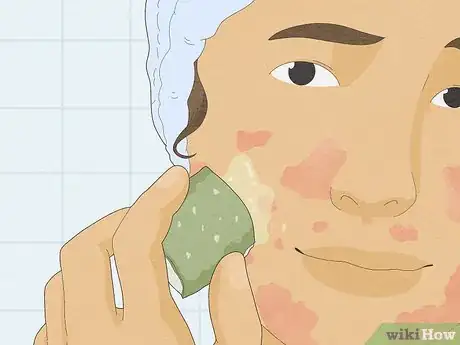
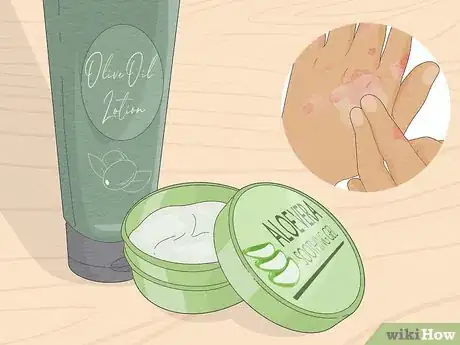

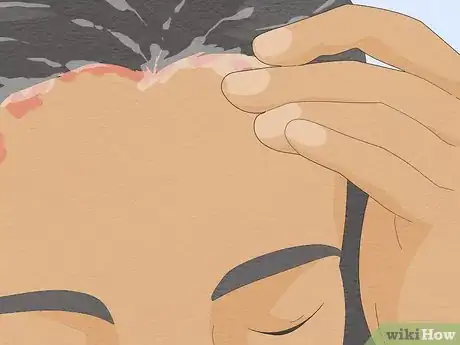
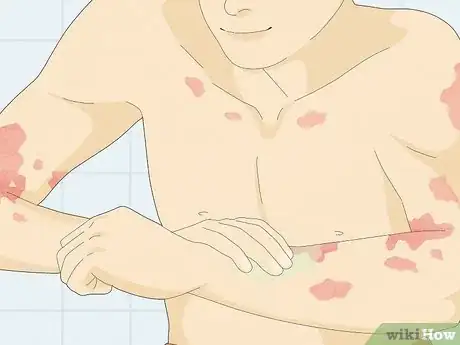



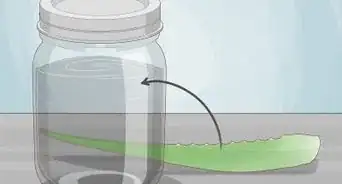



















































Medical Disclaimer
The content of this article is not intended to be a substitute for professional medical advice, examination, diagnosis, or treatment. You should always contact your doctor or other qualified healthcare professional before starting, changing, or stopping any kind of health treatment.
Read More...